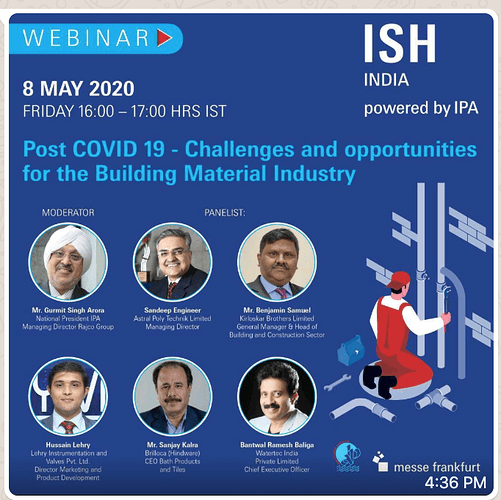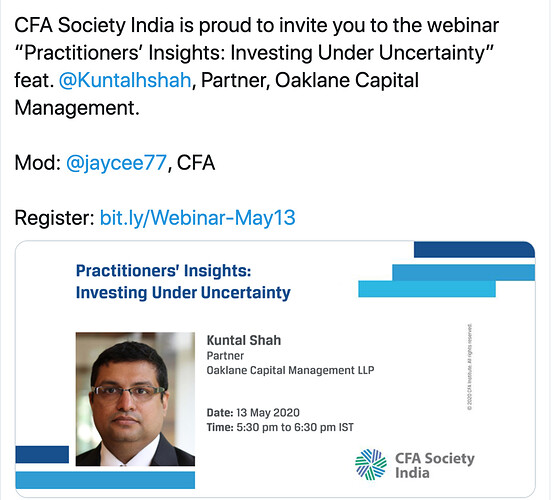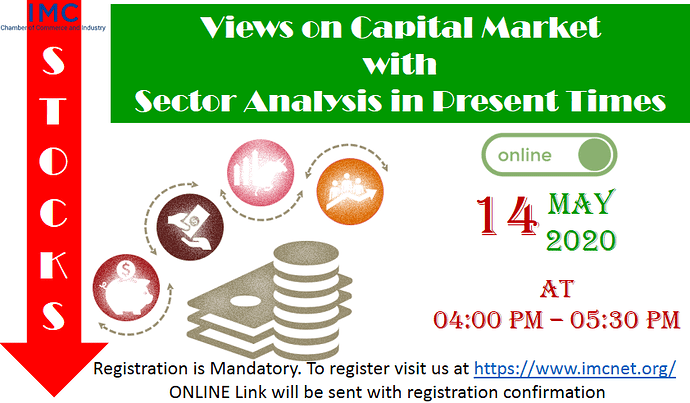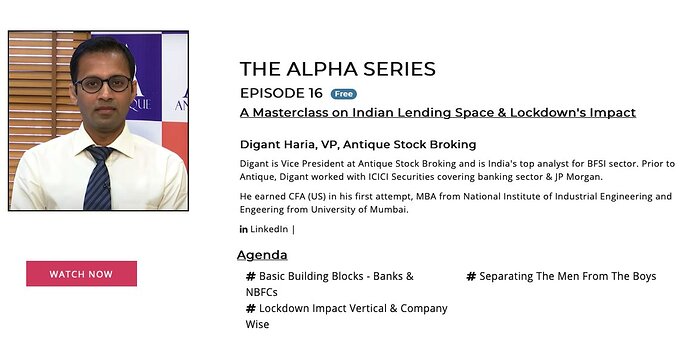Our Managing Director Mr. Sandeep Engineer will share his views on building material industry in the post-COVID-19 world alongside many distinguished industry experts. It will be an insightful session, do join us for this webinar.
Details of the webinar:
When: May 8, 2020 04:00 PM India
Topic: Post COVID - Challenges and opportunities for the Building Material Industry.
Register in advance for this webinar:
https://us02web.zoom.us/webinar/register/5815886137482/WN_UWWG2WTFRDiSaUlDQy2SIg
After registering, you will receive a confirmation email containing information about joining the webinar.
Please use this Topic for posting relevant and current Industry Webinars information that come to you - and you deem will be useful for the Community.
Also links to the recorded session on youtube are welcome here, so that it can act as an useful archive for future reference.
Hi,
Care Ratings has organised few webinars, the recordings available at following links
https://www.youtube.com/user/CARERatingsOnline/videos
http://www.careratings.com/awards-events.aspx
Regards,
Apurva
Marc Cuban’s survival guide for businesses.
Date : May 14, 2020
Time : 07:00 PM India
Please use the link below to register if interested.
https://t.co/ZozM3uufSf?amp=1
Hi Apurva,
Any of these that you found very useful?
Thanks
I find Kuntal Shah’s views very pragmatic. And his mental models are sharp. Worth listening to. I certainly resonate with how he articulates his viewpoints across - comes across as someone who has worked deeply on subject matter.
Kuntal Shah- Investing Under Uncertainties_13th May 2020.pdf (8.0 MB)
Very good pointers here - for serious students ![]()
requesting @spatel to provide Q&A summary
2 posts were merged into an existing topic: Market Meltdown, the Virus, and our Actionables
MUST WATCH!
Ashok Gulati, well known Agriculture reformer, former chief of agriculture cost and prices committee, chief Infosys chair for agriculture, ICRIER - on why this could be a watershed moment for Agriculture Reforms in India because of the proposed changes in the legal framework
a) Essential Commodities Act - removes arbitrary price clamps to enable private players in Storage
b) APMC Act amendment - jurisdiction of Mandis end at the Mandi courtyard
c) Allow “Contract Farming“
*to be tempered with the caveat of what comes out in fine print
But if implemented with full gusto (which also means NO fine prints), then this is no less than the 1991 Reforms he opines, giving a score of 9/10 to the government, for a potentially game-changing moment! The legal barriers - root cause of entrenched inefficiencies and (Mandi) corruption - if removed, could unleash true market force led animal spirits back in Indian Agriculture? Could this be that watershed moment?
spatelTop Contributor
Q. Depressed news all around. What is one mind hack to view the situation more objectively instead of getting just one side views?
First modern pandemic happening in the time of social media where there is amplification of bad news and where news travel fast literary in the matter of minutes. This is leading to great amount of information overload. Human brains are not able to process the frequency and amount of information. So investor would be best served by taking best and honest view of his/her investing time horizon and their temperament to absorb volatility at this stage and hence create adequate cushion for meeting their lifestyle needs and creating adequate buffer to be buyers and not sellers of the assets at the prices which do not make sense.
While hypothetically it is easy to do DCF and say that I would ride it out as couple of quarters or one/two year of earnings do not make material impact in an era of low interest rate and high terminal value being the biggest driver of the value chain. But when the drawdowns happen, they leave physiologically different kind of scares. So, you got to make up your mind - Whether it is a) fear of missing the opportunity or b) fear of losing capital - which is giving you more pain? One has to take a very meaningful call and position the portfolio for much longer period of time. Analysing your portfolio on real time basis or day to day basis I do not think is going to be counterproductive. Because till the time there is definite end in the horizon, the range of outcome is seriously wide. What is the guarantee this will not be a start-stop start-stop economy? Because there is full probability this virus could mutate and could have second wave which is far more infectious and deadlier than the first wave. One has to be aware of wide range of outcomes and be content to take pause once there is narrow of the probabilities and the optionality. No other way. For investors to commit the capital, you have to analyse large amount of information and then focus on two or three critical parts. Right now, the number of critical parts are just too high. And that’s why very wide range of opinion of some of the best masters. If you ask me, in my almost 30 years of career, this is the worst time I am facing to be able to take a definitive mind-map on where I am positioned. There are days where I feel valuations are becoming very juicy, lot of midcaps available cheaply. And there are days where I feel the worst is yet to come. So, volatility in thinking is there and one should take a very calibrated stance after this volatility dies down in mind as well in market.
Q. Is this high uncertainty and high-risk sort of scenario - Can we even define risk at this moment?
In past all the crises have either come from banking crisis where there was over lending or an asset crisis where a particular asset became hot. Here, two deep things are happening at the same time. There has been a pandemic which is creating havoc with human life . There could be a scenario where the hospital capacity infrastructure may not be able to give treatment to all the people needing it that could give you a sense of helplessness. Also, there is synchronized stoppage of global economies which has not happened in the past. We had world war, we had every kind of crisis, I do not recall a crisis that could spread so quickly. Like through airlines you can transfer it thousands of kilometres away and start the infection process there. And, a stoppage of economy which gives you uncertainty about the cash flows, about the asset collaterals. To that extent this is overwhelming. I would say till the health side issue is not taken out I think volatility is going to be around the corners because nobody with seriousness can tell you that this the bottom or this is the top. There would be volatility in thinking as the epidemic progresses. I think this is inevitable. Till the time we don’t have clarity on the duration of the pandemic, its impact on how deep it is and how long it is, I think so range of outcomes are so wide, it is overwhelming some of the best investors. That is why you see Warren Buffett not investing despite sitting on cash. Stanley Druckenmiller coming and saying it is bad. You have whole host of investors which are more accomplished than people like me which are not able to make up their mind and then who am I to take a definitive call. So, positioning your portfolio to handle a very low prices is a must.
Q. There is a disconnect between economy and the market. You had a very bad March and then April you had the huge turnaround more so in the U.S. market. Covered more than half of lost ground in face much more in U.S. Look at the market and then look at the news - there is some sort of resonance which it causes. How do you explain that? Is the FED which is pushing the market? If that is the case, are investors asking for very low risk premium and will that mean going forward we are entering the era of low equity returns?
Two things. If you can predict successfully what is going to be the interest rate going ahead, then probably you could answer quite a lot of these question. Let me step back - The markets today are made up of investors with very different time horizons. There could be algorithms trading for a day to investors like pension funds which might be taking 20 years view to management who are taking much more longer view to index funds which are price insensitive to buyers. There is heady cocktail of investors expecting different things from the same asset class. So obviously there would be bound of volatility. So, every rise will be sold into and every dip will be bought . That is, I think given, given the fundamental construct of the market. Longevity of your capital and stability of your capital as well as your mindset is something which needs to be upfront on the table. And if that is doubtful, then you will be whipsawed by this market and tons of volatility. Going specifically into the nitty-gritty, each market and each asset classes have their own nuances. Like oil - it was technical shortage of storage which resulted into abnormal pricing on the derivates market. So, one has to be very cognizant of interplay of the technical and the fact that there are all kind of market participants. So, one should not be driven by this volatility and one can only be allowing one’s own view to prevail by patiently waiting for your pricing for both i.e. buying and selling. Till the time this pandemic does not have an endgame; virus will determine its endgame and human ingenuity in terms of R&D will determine its endgame, this bound of volatility will continue. And even if FED stimulus began to dominate the narrative, it is just a matter of time people will ask the question and-then-what? Then who is going to pay for it? How is this fiscal stimulus going to impact the inflationary expectations embedded? That is why today you’ve bond investors that are worried about the recession because of the debt overrun and you have gold investors who are saying inflation is just around the corner. So, you have contradictions bundled into the current market and one will have to learn to deal with this contradiction in a very calm and calibrated ways.
Q. Investment opportunities - Which are the co which will survive this? Any contrarian opportunity?
Let us focus on what will not change. Lot of things have changed in short term. And many things have to be changed about our lifestyle and consumption pattern in medium term. But in long term I think so human ingenuity will prevail and go back to our society way of interactions and doing the business. So, one thing to find is invert the problem and ask ourselves the question - what makes a company fragile during this time? So high leverage would be one such point. Concentration of client in one location. Concentration of supply chain in one side. There is whole sort of parameters which will bring out fragility of the organization and those kinds of organization have to be avoided. Also right now is a time of plenty. You have haves and haves-not. So, there are some companies which are price to perfection. Many investors have these questions - today I buy Johnson & Johnson and Nestle yielding me 2% dividend yield and far higher earnings yield with a growth optionality or do I buy U.S. government bond. So, there is lot of movement of capital across asset classes. So, investors who are married to asset class have a problem but investors whose mandate permit them to go across asset class have far higher probability of sailing through. Having said that, since we are talking to predominantly equity investor base of our audience, one should look at what happens after two years. One should take a pause and step back what are the things which are not going to change and where there is zone of safety in terms of valuation. Because what is perceived to be highly safe right now can be highly counterproductive in terms of returns. So I give you narrative not to say I am recommending something - Today even with the sub-sector let’s say financials, people are blindly very risk averse to levered financials but are highly embarrassing the distribution companies like insurance/AMC. But when you bring the price to the equation, you will realize that the margin of safety probably lies in the financials which are levered because probably few out of them will emerge from the very low competitive environment. So, one has to go against the narrative and look are you paying very high price for the rosy certainty. The future returns are the function of current price paid. Please understand many of the asset class investors would sell-off very quickly. Let me give one contra example - in commodities, the last man standing in terms of cost of production and the access to the capital markets via lowered leverage could eventually have far more upside than probably safe company which is you’ve already paid price safety for. It all boils down to one’s choice architecture and what one can sleep well at night - it is unique from investor’s propensity to overpay for quality or bear uncertainty but be compensated by lower price .
Q. Across asset classes investing and should we look at other asset classes (say Gold)?
Let us take live example - If debt securities of a corporate giving equity like return why would you look at equity. Ultimately you have to counterbalance your return and risk profile. Many times, investors which are acting in silos are not aware of far lesser risk and more rewarding opportunities emerging in the peripheries. To give you an example - today the dollar bonds of some of our financials are giving equity like returns because of dislocation and the flight to safety. So, the flexibility to invest across asset class is a desirable one and am cognizant of the fact many of us do not have it. Assuming the investors don’t have, then positioning ourselves on cash and defensiveness are the only two options.
Q. Have you also realigned your portfolio or are you waiting for clarity going forward?
Personally, I have created sufficient cash which allows me to have peaceful sleep and take advantage of the price fall if they may happen with a clear thing that should the stimulus and the monitory easing prevail and the asset class again continue their onward journey or suppose a miracle of vaccine or treatment comes around then I am ready to live with the fear of missing out on opportunities. Secondly, my current focus is on the identifying the companies which are gaining market-share and which are antifragile; they are not obvious. Thirdly, the way I have positioned is - I have included Gold as first-time consideration. So yes, things are changing, and I have been candid to admit this has been one of the most challenging times in my investment career, so I am not taking decisions very quickly. I am sleeping over it and am processing much more information and I am seeking out to seniors opinion before doing anything because many a times they have seen much more or are much more intelligent than me and which has helped me currently. Taking help of far more accomplished investors than me is helping and I think investors should do this.
Q. In this entire scenario are there any positive for India and economy which we can benefit from?
Chinese have a saying - Never waste a crisis. And if you really look at our government has got their act together in the times of crisis. Am very optimistic on our country because if you are an investor you have to be cautiously optimistic but at the same time be realistic on what can happen in short run. Apart from near term issues of stimulus and getting the country back to the economic activities and dealing with contagion pandemic, I think we will be best served if we can take bold labour, land, and laws reform. Especially on legal side, because in India legal system is not functioning and financial system is all about contracts. Many times, sanctity of those contracts is not enforced in right point of time. So, if we can get our act together on attracting investments and making the business environment more conducive for productive growth and corporate activities I think so will be very well served going ahead.
Q. Any last words of advice?
Big results are driven by tail events like this. This is one of the rare events unfolding in front of our eyes. Few pieces of advice - Don’t buy a security till you don’t understand what debt market is thinking about it and vice-versa. Also, nobody knows how and when this will end. In the interim, supply of paper can rise, and capital calls can come in considerable time. Till the effective vaccine or treatment is not found, there is a distinct possibility of very adverse scenario also playing out. And if history is any guide, the decisions that we take now for regulator and corporates and investors will reverberate for quite some time to come. Falling on the side of caution might look foolish in the end but I think so that is price worth paying for at this stage .
Good presentation by Digant Haria on BFSI sector. Big message was that in this sector “Obvious things play out, it takes time though”.
Covered a lot of companies in different financial categories like banking, micro finance, gold loan, CV loan, etc. He has talked about the Covid19 impact on these companies and the way ahead for them. Presentation does not go into minute details of the sector but covers the basic building blocks of finance companies.
Link: Indian Investing Conclave
Implementation wise,
a) Essential Commodities act amendment
c) Contract farming
looks the more doable.
b) is next to impossible - too many vested interests in play. But if there was a Govt which could do this its BJP.- given the control it has on votes in parliament and number of states it control.
Lets see - if Govt walks the talk
Good one. Thanks for sharing.
Thank you for registering for “Post Covid 19 Agriculture - Preparedness of Emerging Agro Chemical Companies”.
Please submit any questions to: anita.agarwal@rayconsulting.in
Date Time: May 20, 2020 04:00 PM India
Webinar with Dr Mark Mobius and Rajesh Sehgal | Equanimity | Marcellus
My notes(far from complete and also apologize in advance if there are any mistakes):
How many bear markets in emerging markets and the degree of decline?
The average decline was 49%(23% to 92%) and average time was 15 months(3months to 3 years).
“This time is different” are the most expensive words in the world.
No one knows if there will be another pullback,things tend to happen suddenly in the age of internet,both fall as well as recovery.
We have seen bear markets in India about 8 times and the recoveries have been very fast and the outlook for India is pretty good.
There is an opportunity to look at the small and medium cap stocks.
The word “unprecedented” has been used an unprecedented number of times.
India was already under stress before Covid,have to back businesses which have inherent strength.
3 timelines while looking at companies:
3-6 months
6-12 months
12-18+ months
Some companies were better prepared for unforeseen problems.
Little champs framework includes tracking companies for six years and eliminate based on quantitative and qualitative parameters like:
- quality of auditors
- off balance sheet items
- free cash flow conversion
- growth + roce(use the components rather than just looking at the headline numbers)
- gross margin
- average working capital days
- interest coverage
- fixed assets etc.
Roce>20,growth>15 and debt/equity<1.
Focus is only quality and management strength rather than market cap.
After this we need to do the bottom up work on individual companies.
“Role of Bio Agri Inputs in Sustainable Agriculture in Post Covid-19 Agriculture”
Bio Agri Inputs are fastest growing and emerging as the substitute for chemical agri inputs globally. These are making remarkable mark with their aggressive penetration and reach
Do join us for deep insights from Leaders of Bio Agri Inputs Industry
On Saturday 23rd of May from 4 PM onwards
Register for Free at https://bit.ly/RAYtalks3bioagri
Talking with Raj Kumar are:
Dr K. R. K. Reddy - Managing Director Sri Bio Aesthetics & President BIPA
Dr Venkatesh Devanur - CEO of SOM Phytopharma & Agri Life & Secretary BIPA
Dr A. John Peter - Chairman & M D Varsha Bioscience and Technology – Vice President BIPA
Mr Praharaju Laxminarayana - Founder & M D AG Bio Systems & Vice President BIPA
Dr Pabbathi Venkata Mohan Rao - Group Chairman - Pasura Crop Care - Treasurer BIPA
Dr Sudha Reddy – Managing Director - K N Biosciences – Joint Secretary BIPA
Ch V Srinivas Director - Agastya Agro – Joint Treasurer BIPA
We welcome you to share questions that you may have relating to Ag Chem Industry by registering for the webinar
Takeaways from Willowood webinar: (As opined by the Panelists)
- Agrichem is considered “Sunrise” industry by Bankers along with Pharma and Telecom currently. These are the only 3 industries Bankers are actively looking at to lend
- FY20 Agrichem Industry grew at 9%. Despite all the covid, and post-covid issues industry prospects are looking good. With normal monsoon, should end FY21 Flat growth, .
- Re: Government Announcement to ban 27 pesticides being seen as
unwarranted/unviable
a) Most industry associations planning to go to court
b) Wont get implemented in a hurry/entirety
c) We should see rollback for most









